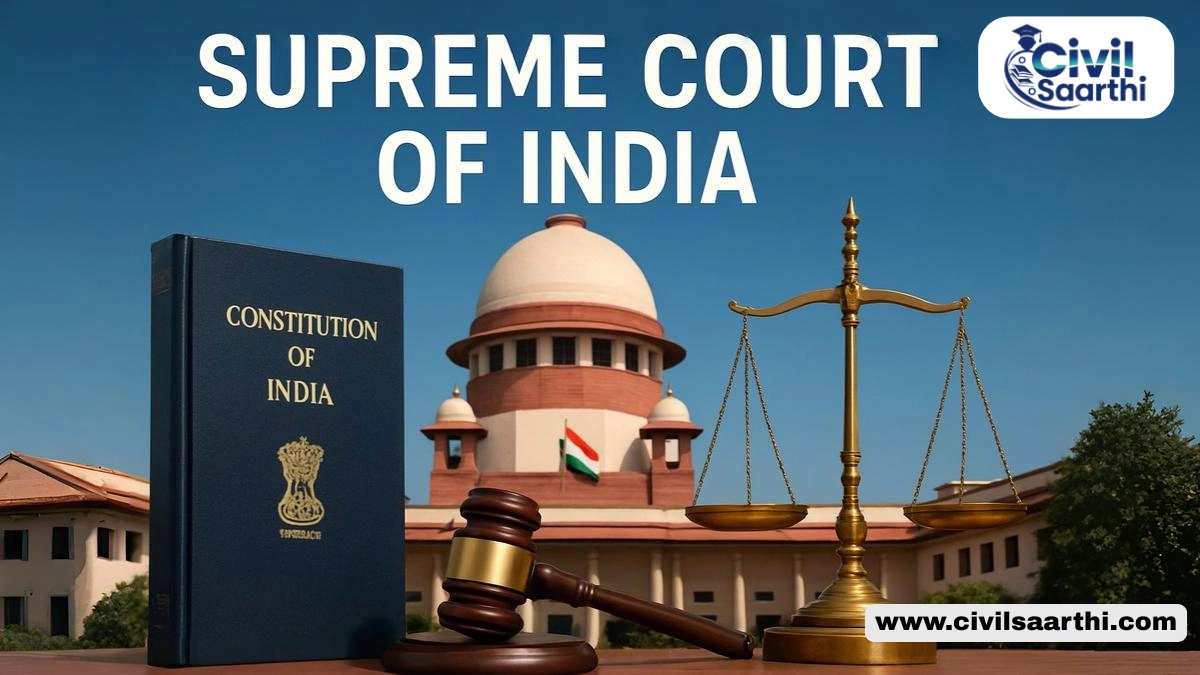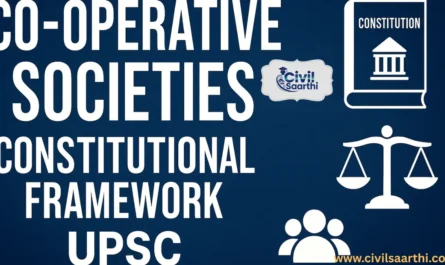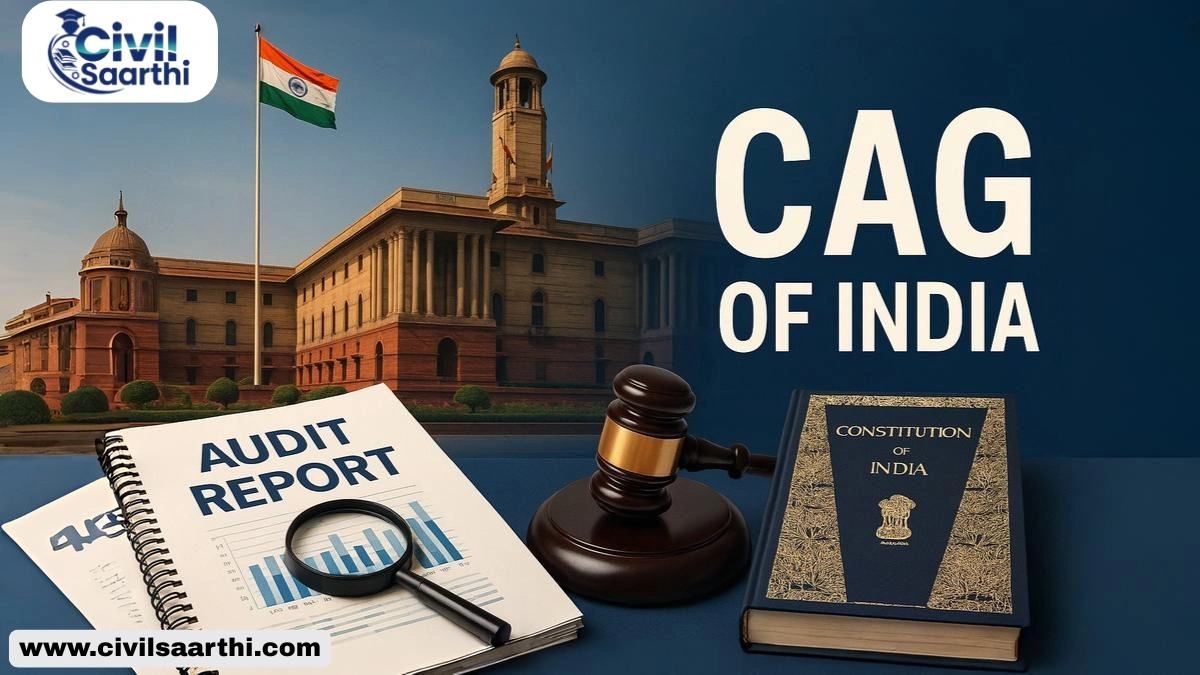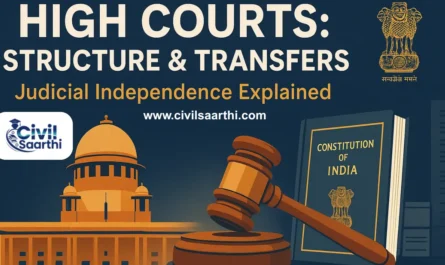Citizenship Polity Notes are a vital part of Indian Polity for UPSC preparation, as citizenship defines the legal identity of a person within the Indian state. In the Constitution of India, citizenship signifies full membership in the political community. Understanding the constitutional, legal, and administrative dimensions of citizenship is crucial, especially with recent debates and reforms around it.
Citizenship Polity Notes
The Citizenship Polity Notes will help aspirants get clarity on constitutional provisions, various modes of acquisition and termination of citizenship, and associated legal provisions like the OCI (Overseas Citizenship of India). In the UPSC exam, this area is relevant both in Prelims (facts and articles) and Mains (analysis and contemporary issues) as per the official UPSC Syllabus given on upsc.gov.in portal.
Citizenship Polity Notes Overview
The broader classification of citizenship under the Indian Constitution and how it differs from other forms of nationality. The Indian model of single citizenship is derived from the UK and is distinct from countries like the USA that allow dual citizenship.
Citizenship Polity Notes Overview | |
| Feature | Detail |
| Constitutional Articles | Article 5 to Article 11, Part II |
| Relevant Law | Citizenship Act, 1955 |
| Administered by | Ministry of Home Affairs |
| Dual Citizenship Allowed? | No |
| OCI/PIO Provision | Yes, under separate legal framework |
| Key UPSC Topics | Acquisition, Loss, OCI, Article 5-11 |
Citizenship Polity Notes: Citizenship Provisions (Article 5-11)
This section of the Citizenship Polity Notes explains the constitutional framework laid down between Articles 5 to 1, Part II of the Indian Constitution. These articles do not describe ongoing citizenship regulation but only deal with citizenship at the commencement of the Constitution.
Citizenship Provisions (Article 5-11) Part II of Indian Constitution | ||
| Article | Provision Title | Detailed Description |
| Article 5 | Citizenship at the commencement of the Constitution | Any person who had their domicile in the territory of India and: (a) was born in India, or (b) either of whose parents were born in India, or (c) who had been ordinarily resident in India for not less than 5 years before 26 January 1950, shall be a citizen of India. |
| Article 6 | Rights of citizenship of certain persons who migrated from Pakistan | Persons who migrated from Pakistan to India before 19 July 1948 and have been ordinarily residing in India since then, or who migrated after that date but were registered by an officer of the Government of India, can be considered Indian citizens under prescribed conditions. |
| Article 7 | Rights of citizenship of certain migrants to Pakistan | Those who migrated to Pakistan after 1 March 1947 but later returned to India under a permit for resettlement or permanent return can be considered Indian citizens, subject to legal provisions. |
| Article 8 | Citizenship for Indians residing abroad | A person of Indian origin residing outside India (e.g., in another country), who or whose parents or grandparents were born in India, can be registered as a citizen of India by the Indian diplomatic/consular mission in that country. |
| Article 9 | Termination of citizenship on acquiring foreign citizenship | A person who voluntarily acquires the citizenship of another country will no longer be an Indian citizen. Dual citizenship is not permitted under Indian law. |
| Article 10 | Continuance of citizenship rights | Every person who is or is deemed to be a citizen of India under the preceding articles shall continue to be a citizen, subject to the laws made by Parliament. |
| Article 11 | Parliament’s power to regulate citizenship by law | Parliament has the authority to make any provision with respect to the acquisition and termination of citizenship and all other matters related to citizenship. This allows for statutory frameworks like the Citizenship Act, 1955. |
Acquisition of Citizenship
The acquisition of citizenship explains the various ways in which Indian citizenship can be obtained under the Citizenship Act, 1955. There are five legal modes: Birth, Descent, Registration, Naturalization, and Incorporation of Territory. Each mode reflects the law’s inclusiveness and constraints.
Acquisition of Citizenship | |
| Mode of Acquisition | Conditions & Notes |
| By Birth | Citizenship by birth is governed by Section 3 of the Citizenship Act, 1955. The rules vary based on the date of birth:
|
| By Descent | Governed by Section 4. A person born outside India shall be a citizen of India if:
|
| By Registration | As per Section 5, certain categories can apply for citizenship:
|
| By Naturalization | Defined under Section 6. Granted at the discretion of the Government of India if the applicant:
|
| By Incorporation of Territory | As per Section 7. If a foreign territory becomes part of India, the Government of India may specify the persons from that territory who shall be citizens of India. Example: Citizenship granted to people of Sikkim after it became part of India in 1975. |
| Assam Accord (1985) | As per the Assam Accord, persons of foreign origin who entered Assam before 25 March 1971 are considered Indian citizens; those entering after are to be detected and deported. |
Citizenship Polity Notes: Loss of Citizenship
The Citizenship Polity Notes on loss of citizenship focus on the three legal ways one may lose Indian citizenship: Renunciation, Termination, and Deprivation. These ensure that citizenship is retained only by those loyal to the Indian Constitution.
Citizenship Polity Notes: Loss of Citizenship | |
| Mode | Explanation |
| Renunciation | Voluntarily giving up Indian citizenship |
| Termination | Automatic loss on acquiring foreign citizenship |
| Deprivation | Government may strip citizenship due to fraud, disloyalty, etc. |
Fundamental Rights Provided to Indian Citizens Only
Some fundamental rights in the Indian Constitution are exclusively available to Indian citizens and not to foreigners. These rights are essential for maintaining equality, liberty, and democracy among Indian nationals. They help ensure political freedom, cultural identity, and participation in governance.
| Fundamental Right | Article(s) | Description |
|---|---|---|
| Right to Equality | Article 15 & 16 | Prohibits discrimination and ensures equality in public employment for citizens only. |
| Right to Freedom | Article 19 | Guarantees six freedoms (speech, expression, assembly, association, movement, residence, profession) only to citizens. |
| Cultural and Educational Rights | Article 29(1), 30 | Grants protection to minorities to conserve their culture and establish educational institutions. |
| Political Rights | Implied under Article 326 | Right to vote and contest elections is reserved for Indian citizens only. |
Citizenship Polity Notes: Overseas Citizenship of India (OCI)
The Citizenship Polity Notes must include the concept of OCI, which is a form of limited citizenship for Persons of Indian Origin (PIOs). Though not full citizenship, OCI provides multiple privileges including visa-free travel, rights to work, and property ownership.
Citizenship Polity Notes: Overseas Citizenship of India (OCI) | |
| Feature | Details |
| Eligibility | Person of Indian origin, not a citizen of Pakistan/Bangladesh |
| Rights Provided | No visa requirement, property rights, economic participation |
| Restrictions | No voting rights, government jobs, or constitutional office |
| Cancellation Grounds | If activities are against India’s interest |
Also Read: Preamble of the Indian Constitution
Difference between NRI, OCI and PIO
NRI, OCI, and PIO are terms used to describe individuals connected to India but living abroad. A PIO (Person of Indian Origin) was a similar category for foreign nationals with Indian roots, but this scheme was merged with the OCI category in 2015.
| Category | NRI (Non-Resident Indian) | OCI (Overseas Citizen of India) | PIO (Person of Indian Origin) |
| Definition | An Indian citizen residing outside India for employment, business, education, or other purposes. | A foreign national of Indian origin who has been granted OCI status by the Government of India. | A foreign national (not a citizen of Pakistan, Bangladesh, etc.) who had Indian ancestry (Term now merged with OCI since 2015). |
| Citizenship Status | Holds Indian citizenship. | Does not hold Indian citizenship. Has OCI card. | Did not hold Indian citizenship. (Scheme discontinued; merged with OCI). |
| Passport | Holds an Indian passport. | Holds a foreign passport with OCI card. | Held a foreign passport with PIO card (no longer issued). |
| Voting Rights in India | Yes | No | No |
| Eligibility for Government Jobs | Yes | No | No |
| Need for Visa to Visit India | No, as Indian citizen. | No, multiple lifelong entry visa with some restrictions. | No, visa-free entry for 15 years (now merged with OCI). |
| Stay Limit in India | No limit. | Can stay indefinitely in India. | Earlier allowed to stay up to 180 days without registration (no longer applicable). |
| Property Purchase Rights | Can buy all types of property. | Can buy residential and commercial property (not agricultural land). | Same as OCI (not applicable after merger). |
| Tax Status | Taxed only on income earned/received in India if stays less than 182 days/year. | Taxed only if income is from India. | Same as OCI. |
| Issued By | Ministry of External Affairs (via Indian Missions) | Ministry of Home Affairs, India | Ministry of Home Affairs (scheme discontinued) |
Supreme Court Judgments on Citizenship in India
Berubari Union Case (1960): The SC clarified that citizenship is governed by the Constitution under Articles 5–11, and Parliament has the exclusive power to legislate on citizenship matters. It also ruled that any ceding of Indian territory (affecting citizenship) requires a constitutional amendment.
Rooplal Meena v. Government of India (2001): This case clarified that a foreign spouse of an Indian citizen is eligible for citizenship only through proper registration and fulfillment of residency criteria, even if married to an Indian.
Binoy Viswam v. Union of India (2017): Though a PAN-Aadhaar linkage case, the Court emphasized the relationship between citizenship, identity, and the state’s right to verify citizenship for welfare and national security purposes.
Citizenship UPSC Prelims & Mains PYQs
Question: With reference to India, consider the following statements: (2021)
There is only one citizenship and one domicile.
A citizen by birth only can become the Head of State.
A foreigner once granted citizenship cannot be deprived of it under any circumstances.
Which of the statements given above is/are correct?
- 1 only
- 2 only
- 1 and 3
- 2 and 3
Answer: (a)
UPSC Practice MCQs on Citizenship
Q1. Under which Article of the Indian Constitution can the Parliament make laws regarding acquisition and termination of citizenship?
- Article 5
- Article 7
- Article 11
- Article 9
Answer c: Article 11
Q2. Which of the following situations can lead to the loss of Indian citizenship?
(A) Acquiring citizenship of another country
(B) Committing fraud in citizenship application
(C) Declaring renunciation formally
(D) All of the above
Answer D: All of the above
Q3. Which of the following best describes the provision under Article 9 of the Constitution of India?
- A) A person born in India automatically acquires Indian citizenship regardless of the nationality of parents.
B) A person who acquires foreign citizenship voluntarily ceases to be an Indian citizen.
C) A person residing in India for over 10 years is deemed an Indian citizen.
D) A person of Indian origin residing abroad is automatically granted Indian citizenship.
Answer: B
Q4. Under the Citizenship Act, 1955, who has the authority to grant citizenship by naturalization in India?
- A) Chief Justice of India
B) Prime Minister of India
C) Ministry of External Affairs
D) President of India on the recommendation of the Ministry of Home Affairs
Answer: D
Which of the following rights is NOT available to OCI (Overseas Citizen of India) cardholders?
(A) Right to vote
(B) Right to own agricultural property
(C) Right to travel visa-free
(D) Right to undertake business in India
Answer: (A)
Citizenship of Indian Constitution FAQs
What is the meaning of citizenship in Citizenship Polity Notes?
Citizenship in Citizenship Polity Notes refers to full membership of an individual in the Indian state, along with rights and responsibilities.
Which articles are covered under Citizenship Polity Notes?
Citizenship Polity Notes include Articles 5 to 11 which cover citizenship provisions at the commencement of the Constitution.
What are the modes of acquiring citizenship in Citizenship Polity Notes?
The Citizenship Polity Notes mention five modes—by birth, descent, registration, naturalization, and incorporation.
Can OCI holders vote as per Citizenship Polity Notes?
No, Citizenship Polity Notes clearly state that OCI holders do not have voting rights or access to constitutional posts.
Is dual citizenship allowed in India under Citizenship Polity Notes?
According to Citizenship Polity Notes, India does not allow dual citizenship under any condition.
Which law regulates Indian citizenship in Citizenship Polity Notes?
The Citizenship Act, 1955 is the primary legislation regulating citizenship, as noted in Citizenship Polity Notes.
Why is Article 11 important in Citizenship Polity Notes?
Article 11 in Citizenship Polity Notes gives Parliament the authority to make laws regarding citizenship beyond the original constitutional provisions.







